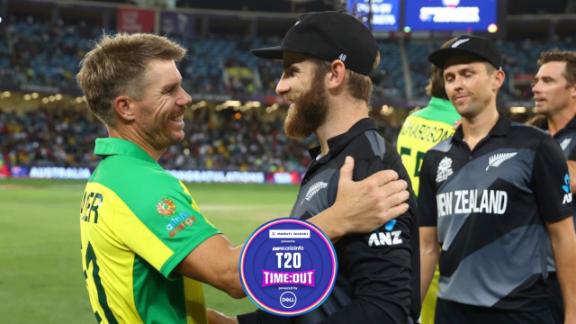Australia 173 for 2 (Marsh 77*, Warner 53, Boult 2-18) beat New Zealand 172 for 4 (Williamson 85, Hazlewood 3-16) by eight wickets
This has been a tournament of tricky, two-paced pitches, and, as a consequence, it has recorded the lowest scoring rate of any T20 World Cup. The final, however, came as close to pure T20 as anything we have seen over these past few weeks in the UAE. A new record for the fastest fifty in a T20 World Cup final was established and, in no time, broken, and if Kane Williamson ended up on the losing side and Mitchell Marsh among the winners, the difference lay in what happened around them.
Williamson scored 85 off 48 balls, and New Zealand's other batters made 78 off 73 between them.
Marsh finished on an unbeaten 77 off 50. Australia's other batters combined to make 86 off 63. This included a superbly controlled half-century from David Warner, who in this tournament has returned to his best as a T20 opener after an unsettled and unsettling IPL, and a breezy cameo from Glenn Maxwell, to whom fell the honour of playing the winning shot: a reverse-swipe past short third man off Tim Southee.
Australia won by eight wickets, with seven balls to spare, and at long last, they were T20 world champions.
Australia weren't among the favourites when this tournament began, but look down that line-up once more. You can't have hitters of the calibre of Warner, Aaron Finch, Marsh, Maxwell and Marcus Stoinis and not be a seriously good T20 team for too long. The bowlers played their part too - not least Josh Hazlewood, whose into-the-pitch legcutters enabled him to return figures of 4-0-16-3 in a match with a combined run rate of nearly 8.9 - but this was primarily a triumph of T20's most vital skill: boundary hitting.
Australia, on the day, were markedly better than New Zealand at this skill, though it certainly helped that they won the final toss of a heavily toss-influenced tournament.
A slow beginning
Much like England and Pakistan in their respective semi-finals, New Zealand went at a sedate pace through the first ten overs of their innings - and not just relative to the last ten. At the halfway point, they had only lost one wicket, but they had just 57 on the board.
Between the fourth over - when Martin Guptill punched Hazlewood in front of point - and the ninth - when Williamson stepped out and slapped Marsh through the covers - New Zealand went 32 balls without a boundary. This period included some tight bowling - particularly from Hazlewood, whose cutters denied the batters both room and pace to work with, and Adam Zampa - but also some quiet overs where New Zealand didn't seem to try to force the issue at all.
The seventh over, which featured the offspinner Maxwell bowling to two right-hand batters, was a case in point: one dot and five quiet singles to the deep fielders, the sort of singles the bowling team is more than happy to concede.
Guptill eventually made 28 off 35 balls, and it wasn't necessarily the innings of a player looking to attack but not succeeding in doing so. For 22 of the 35 balls he faced, his intent was either to defend or rotate the strike, according to ESPNcricinfo's data.
Williamson vs Starc
This was one of the defining contests of the match, and it could have been over in one ball, had Hazlewood held on to a straightforward chance at fine leg in the 11th over. Hazlewood put it down, however, and Starc ended up on the wrong side of a shellacking.
The most severe punishment came in the 16th over, when Williamson went 4, 4, 6, 0, 4, 4 against the left-arm quick. There were some outstanding shots in this sequence, most notably a whipped six off the pads and over deep-backward square-leg, but the two shots that really summed up the exchange - and Williamson's innings - were a pair of edges to the third-man boundary.
With Starc bowling from left-arm over, and with both backward point and third man in the circle, Williamson probably knew he would get four if the ball was outside off stump and he swung hard and edged. Starc ended the night with figures of 4-0-60-0 - the worst recorded in a T20 World Cup final.
Australia dominate the first ten overs
New Zealand, as mentioned above, made 57 for 1 in their first ten overs. Australia responded with 82 for 1.
This was partly down to intent. Finch showed plenty of it despite only spending seven balls at the crease. Having charged at Trent Boult and hit him down the ground for four in the third over, he charged him again the very next ball, failed to get to the pitch of it, but went hard anyway: that he miscued and was caught in the deep may have been an unfortunate consequence, but not one he was fearful of.
It was also partly down to indifferent bowling. New Zealand's innings had shown that off-pace and into the pitch was the way to go for the quick bowlers, but Adam Milne, much like Starc before him, went for peak pace. Marsh, who had just come to the crease, hit his first three balls for 6, 4, 4. The first of those shots, a pick-up shot that sailed effortlessly over the square-leg boundary, was also a warning of how well he was seeing the ball.
And that was the third ingredient in Australia's dominance through the first half of their innings: in Marsh and Warner, they had two batters in terrific form, batting on a flat pitch, and growing in confidence each time they middle the ball.
Warner's mastery peaked in the ninth over, when he toyed with Ish Sodhi. The first two balls he faced from Sodhi weren't bad balls as such, but there was no way he was letting the legspinner settle. A wide-ish length ball was flat-batted straight past the bowler and a sprawled long-on fielder for four. Sodhi straightened his line next ball, and Warner reverse-paddled him for a cute double past backward point. Then Warner went down the track and failed to reach the pitch, giving up a rare dot ball, but he had planted seeds for future boundaries. In the immediate future. Sodhi's next two balls were short and floaty respectively, and they went for 4 and 6.
Marsh muscles Australia home
Australia's batters were particularly harsh on the short or even marginally short ball, and Marsh exemplified this. Six of his ten hits to or over the boundary came off shots that could be loosely grouped under the "pull" category, even if the last of them, flat-batted to the long-off boundary, stretched that definition somewhat.
There was to be only one brief flickering of hope for New Zealand, when Boult - whose slower cutters enabled him to evade the punishment that all his colleagues took - sneaked a shortish ball under Warner's pull to bowl him in the 13th over. But Marsh - who reached his fifty in the next over with a big six off Sodhi, bettering Williamson's 32-ball effort by one ball - and Maxwell combined to snuff it out ruthlessly.




